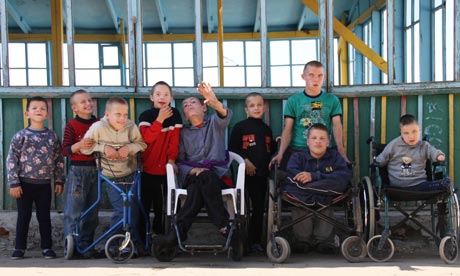Wasted, wax-coloured little bundles of twisted limbs lie, day after day after day, in cots. Huge eyes stare – unbearably unreproachfully – from tiny, emaciated faces. The children who aren't bedridden rock back and forth on sofas and by windows for lack of anything better to do. And this, film-maker Kate Blewett notes, is one of Ukraine's better institutions. The owner, Nikolai Slavov, and his skeleton staff are caring as best they can for their charges but are bedevilled by lack of funds, their country's lack of infrastructure and a government that seems to care nothing for the children's plight.
When Blewett and one of Slavov's staff visit one of the children in hospital – they are taking food and nappies because everything must be provided for patients – it is not the smell of an over-full diaper that greets them, but the smell of a child's flesh rotting. When Blewett questions the doctor, he tells her: "There are many other children like this. You have only seen one." The words are cruel, but his voice has the timbre of desperation. What can you do with a pint of resources and an ocean of suffering?
Ukraine's Forgotten Children (BBC4) was an examination of the legacy of the communist system whereby the parents of disabled children were allowed – encouraged, expected even – to hand over their offspring to the state, which, it was deemed, was better able to care for the children than they were. Though Ukraine gained independence from the Soviet Union in 1991, the practice continues. And, as the number of adults turning to drink and drugs in the country increases (along with the spread of HIV and Aids), so is the number of "social orphans". Their parents live, but have no rights and, for the most part, never visit.
What can you say about such a film except that – as with Blewett's previous films The Dying Rooms (in 1996, about the fates of unwanted children in communist China) or Bulgaria's Abandoned Children (about the inhabitants of a special care home there) – if you saw it, you will never forget it and if you didn't, paltry words on a page will never convey even half the horror.
If the children survive into adulthood – and not the least of the dreadful details in the film was that every institution has its own cemetery – they go into adult, psychiatric or geriatric homes, where they are more often than not drugged into stupor or used as slave labour for life. If they are designated "incapacitated" – which can happen without them ever being personally examined by a medical worker or any other kind of official – they have no rights and no possibility of leaving.
Through an amazing woman called Tatyana Makarava, Blewett meets – secretly, in a field outside their group home – Lyonya and Slava, two "incapacitated" inmates. Lyonya talks of punishment beatings, forcible injections of drugs that "twist your body inside out" and even murders, but it is the look of terror on Slava's face when word reaches them that the home's owner has found out what they are doing that speaks loudest.
She also meets 30-year-old "incapacitated" Boris, who after 24years of institutionalisation – during which he was raped, drugged and forced to carry out and bury the home's dead (interring an estimated 150 corpses in one two-year span) – was rescued by one of his care workers ("God bless her for offering her hand to me") and now lives with her and her family. He talks calmly and lucidly about this suffering, his eloquence as powerful a rebuttal of his diagnosis as his words are condemnation of the system.
It is almost unbearable to watch. How she finds the courage to seek out and stare into the face of such suffering long enough to film it, I do not know. Nor do I know where she finds the wisdom and mastery of herself then to tread the line between shocking us so much that we are compelled to attend but not – not quite – so awful that we must look away. Or how she assembles something that grapples with and informs us comprehensibly about the wider social and political issues, rather than dissolving into one long, screaming howl of pain.
But she has foregone any such personal indulgence and produced something powerful instead of merely emotive. The Dying Rooms caused an international outcry about the terrible things it uncovered. It can only be hoped that Ukraine's Forgotten Children will do the same. There are 80,000 of them out there, waiting for the world to change.





 Strandtent of weeshuis
Strandtent of weeshuis




